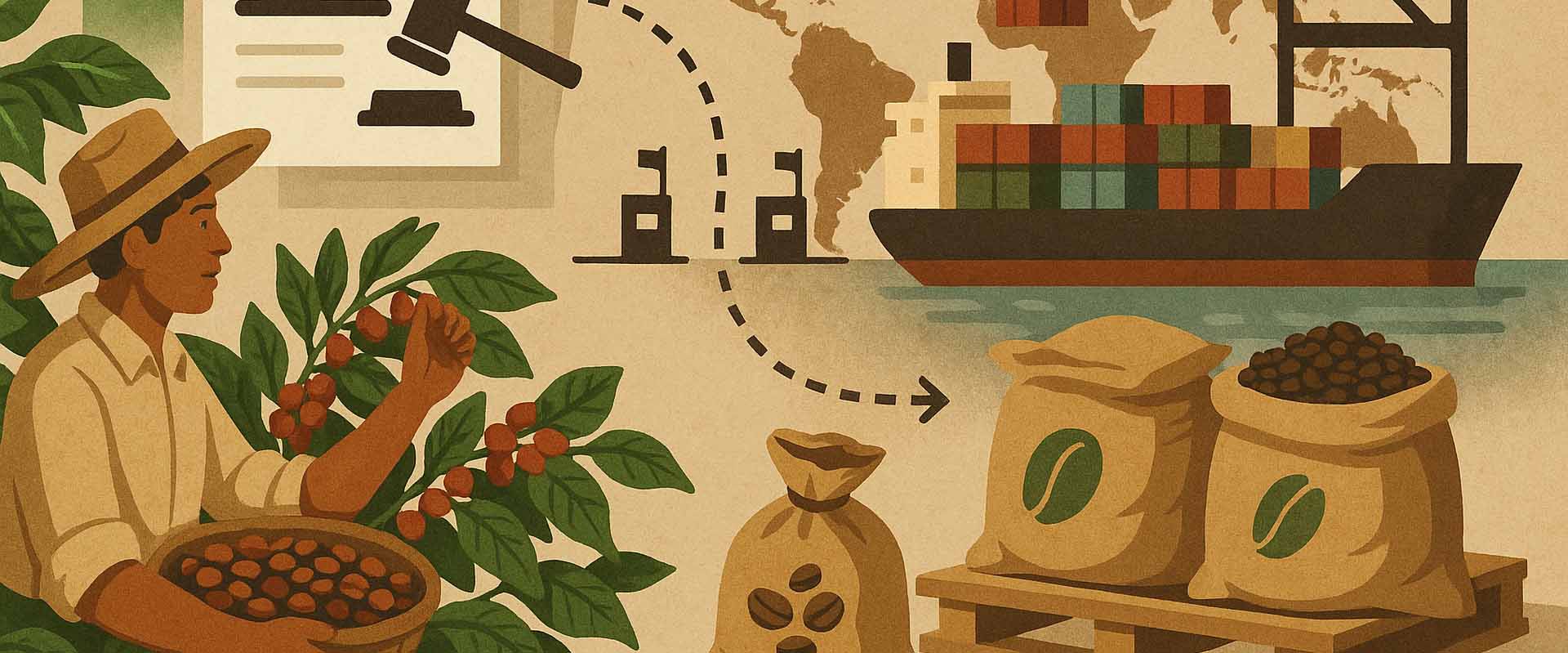Brewing Trouble: How Tariffs Are Squeezing the Coffee You Love

Table of Contents
At Alpen Sierra Coffee, we believe every cup should tell a story — about the land, the farmers, and the craftsmanship that brings beans from faraway mountains to your morning mug. But lately, another story has been brewing in the background: trade tariffs.
They may sound like something only politicians and economists worry about, but tariffs are hitting close to home. In fact, they’re reshaping the price and availability of specialty coffee in ways that affect small farmers at origin and boutique roasters like us here in the Sierra.
What’s Happening With Coffee Tariffs Right Now
For years, most green coffee beans entered the U.S. duty-free. That changed in 2025. New tariffs now slap anywhere from 10% to 50% taxes on coffee depending on the country of origin.
Here’s what that looks like today:
- Brazil – 50% tariff (since August 1, 2025)
- Colombia – 10%
- Ethiopia – 10%
- Vietnam – 20%
- Indonesia – 19%
- Guatemala, Honduras, Peru – 10%
- Costa Rica – 10%
- Uganda – 10%
- Mexico – 0% (thanks to USMCA trade rules)
Why does this matter? Because Brazil alone supplies a third of all U.S. coffee imports — nearly 8 million 60-kg bags a year. A 50% tariff on that much coffee is a shockwave through the entire industry.
Why Boutique Roasters Feel It the Most
Large coffee companies can spread costs across millions of pounds of coffee. They hedge, diversify, and negotiate with governments.
Small roasters like us don’t have those buffers. When tariffs raise the price of imported beans or even something as simple as a coffee pouch, those extra costs land squarely on our roasting tables. And because we care deeply about sourcing from specific farms and co-ops, switching origins isn’t always an option.
We either absorb the cost — which eats into already slim margins — or pass some of it on, which risks alienating loyal customers who trust us for both quality and value.
A Real-World Example
Let’s put real numbers on this.
One container of Brazilian coffee
- A typical 20-foot container holds about 320 bags (60 kg each), or roughly 42,000 pounds of green coffee.
- At an average price of $2.10 per pound, that’s about $89,000 of coffee.
- With the new 50% tariff, the duty is $44,500 — adding $1.06 per pound before roasting, shipping, or packaging.
Suddenly, coffee that cost $2.10 per pound now costs us over $3.16 per pound just to land in the U.S.
The hidden hit: packaging
It’s not just beans. Many roasters (including Alpen Sierra) use eco-friendly multilayer bags sourced from Asia. Those fall under tariff codes that carry an additional 25% surcharge if made in China.
For example:
- 50,000 pouches at $0.20 each = $10,000
- Tariffs and fees add nearly $2,800 extra
- That’s a 28% markup just to put coffee in a bag
Combine beans and bags, and a small roaster may face $47,000+ in extra government charges on just one container and one batch of bags.
Why This Matters for Farmers, Too
It’s easy to think tariffs just hurt U.S. companies. But smallholder farmers are caught in the squeeze, too. When roasters in the U.S. cut back purchases of Brazilian or Colombian coffee because of tariffs, farmers at origin lose market access. That threatens the very communities specialty coffee is meant to support.
And when farmers can’t sell at sustainable prices, they cut back on quality investments — like careful picking, better fermentation, or eco-friendly farming practices. In the long run, tariffs chip away at the diversity and quality that make specialty coffee so unique.
How Alpen Sierra Is Responding
At Alpen Sierra, we refuse to compromise on quality or our farmer partnerships. Here’s how we’re navigating the storm:
- Supporting diverse origins: We continue to source from a broad range of farms to balance cost and quality while still honoring relationships built over decades.
- Educating our community: Transparency matters. When you buy Alpen Sierra, you’re not just buying coffee — you’re supporting a chain of people from farmers to roasters who are all impacted by policy decisions far beyond their control.
The Bottom Line
Trade tariffs may sound abstract, but they’re changing the price of your morning coffee. For small farmers abroad and boutique roasters here at home, they’re more than numbers — they’re make-or-break costs.
At Alpen Sierra Coffee, we remain committed to sourcing ethically, roasting with care, and delivering the quality you’ve come to expect. But it’s important to know that the challenges behind the cup are growing.
So the next time you sip your favorite blend, remember: that smooth, rich flavor isn’t just the result of nature and craft — it’s also a testament to resilience in the face of global trade politics.
And by choosing Alpen Sierra, you’re helping small roasters and farmers weather the storm.
In closing, please contact your congressional delegate and voice your opinion regarding the trade tariffs and how they are affecting all of us. Coffee cannot be commercially produced in the United States and thus should be firmly exempt from any trade tariff amounts.
Thank you.

Top Coffee Growing Regions Around the World


